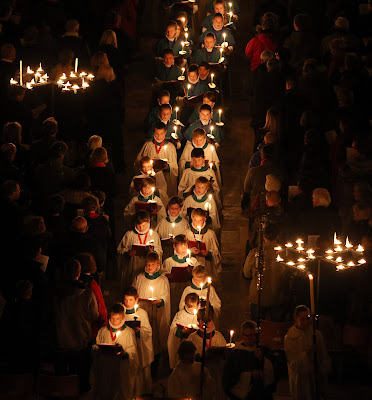 |
| "So, we're just going to let scores of children carry open flames in the cathedral? Did no-one second-guess this idea?" |
As Michael noted in our previous post, last Sunday was the Feast of Christ the King, which closes out the liturgical year. Thus, the start of Advent (derived from the Latin for "coming") today marks a new year, as well as the beginning of that short but intense time of solemn waiting and joyful expectation. Christmas will be upon us in not even four weeks, giving us precious little time to reflect upon its true meaning.
Well, yes, of course. But I'm talking about Jesus.
Last Sunday, there were two choices for the Gospel reading, both from Luke. Each one places a very different emphasis on the Kingship of Christ. The one which most of you heard and which Michael referenced on Thursday is the exchange between Christ and the thieves as they are crucified. The crowd mocks Jesus and challenges Him to save Himself if He is truly the Son of God. One thief continues the taunting, saying He should save all three of them. But the other thief, whom we now call Dismas, knows better and rebukes the criminal, noting that Jesus is an innocent man, whereas the two of them deserve their fate. Dismas asks that Christ remember him when He comes into His Kingdom, and Jesus promises that they shall share Paradise together.
But the other reading shows Christ in a far more glorious light — and, without context, a far more dishonest one. It tells the story of Jesus riding on a donkey into Jerusalem, to great fanfare. The people adore Him. He is treated like a Prince, nay, a King! But these same people would betray Him in mere days, casting Him aside like so much rubbish. Jesus to them was never a leader to be followed into battle, a lifestyle to be cherished and shared in good times and in bad. Jesus was just a fad, a fun plaything to champion when He was popular and a lame burden to dispose of when He was not.
Have we really changed in 2,000 years?
Putting aside the perennial debate over the "War on Christmas", there really is no happier time to be a Christian than Advent. Even with the added distraction of holiday consumerism, there's just a feel to Christmastime which unites our largely secular society. All of the trappings of the season make Jesus unavoidable.
And who would want to avoid Him? The Jesus of Christmas is inoffensive and — literally — adorable. Out are the images of scary, bloody, crucified Jesus. In are the humble, maternal, even pastoral images of the Christ Child being doted on by the Virgin Mary and Joseph, His foster father. We love babies. Who doesn't love babies? (I mean, besides Planned Parenthood. Amirite, pro-lifers?) Think about it: Most Americans usually ignore the British Royals, but when the heir to the throne was born back in July, we all cared and we still don't know why.
 |
| OLD AND BUSTED |
 |
| NEW HOTNESS |
There is a poetry to the liturgical year. It begins with Advent — a baby shower, of sorts, complete with gifts and parties for the newborn's arrival. After Christmas and Epiphany, it crescendos with Lent and reaches its apex with the Triduum: the violence, betrayal and darkness of Good Friday countered by the Resurrection, in all of its glory, honour and brightness. Then, we have Pentecost, followed by a long stretch we usually call Ordinary Time. There are many important feasts throughout the remainder of the year, but for the most part, Christians tend to drift away from the Faith during this period. (And the fact that much of it takes place during summer definitely does not help matters.)
But we humans are fickle creatures. Left to our own devices, we tend to lose our focus. The decline of the monarchy has led many to say that we have no need for gods or kings. So, the responsibility which comes from obeying both in the same Person fills us with angst. How brilliant, then, that our Lord should come to us as a child, as helpless as each of us, so that we might relate to Him and love Him first, if we could not first fear Him!
As was prophesied, a little child shall indeed lead us. Whether we choose to follow, however, is obstructed only by the stubbornness of our own free will. Yes, let us adore Him, but let us do so with the respect owed a King. We can certainly kneel before Him, even if He can't walk yet.
Not as of old a little child
To bear, and fight, and die,
But crowned with glory like the sun
That lights the morning sky.
—From "The King Shall Come When Morning Dawns", translated by Rev. John Brownlie


No comments:
Post a Comment